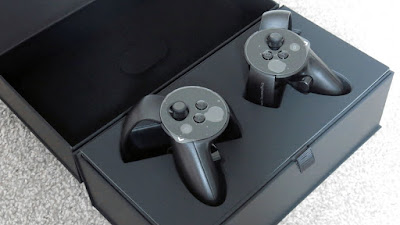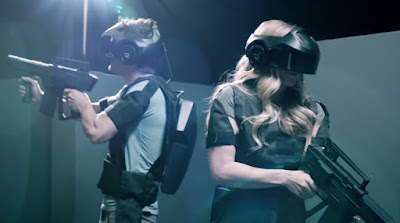
After being submissive for years, Virtual Reality (VR) finally got the move it needed in recent years, thanks to the renewed interest by major tech companies like Samsung, Sony, Google, Microsoft, HTC, and Facebook.
All things considered, the year 2016 wasn't generally what we had all foreseen for VR. Regardless of the strong additions made by the industry, its somewhat VR didn't meet expectations of clients in general. The reasons were, obviously, self-evident. The joined cost of a proper VR headset and a capable VR-Ready gaming PC, console or high-end smartphone was excessively costly for many wallets, and there weren't sufficient games to justify it as a smart investment.
We're currently into 2018, and similar concerns still torment the virtual reality scene. But, the players included aren't hitting the brakes at any point in the near future. Hardware manufacturers and game devs are cooperating to push VR into a much brighter future, which will bring more affordable gadgets, enhanced visual quality and better software.
The following is a glance at what to expect of VR Gaming in the future.
1. Less Virtual, More Reality

As of now, VR gaming is basically restricted to a user's visual and auditory senses, with no regard for other biological aspects like temperature, smell, fatigue and so on.
Accommodating to as many senses as possible is the key to unlocking the full potential of virtual reality. The gaming experience of the future is hence likely to break the barrier between the virtual realm and the physical world by joining more methods of not only viewing, but feeling VR.
The change from immersive to fully interactive won't be here for some time, yet game developers are as of now considering approaches to fortify the reality factor of VR, and at last fade out the virtual bit.
2. Better Games

Video game developers have achieved a lot over the last two decades. Due to the ambitious innovation and rapid technology advancement, the games of today look better than ever before.
However, the new age of virtual reality has urged game creators to go back to the drawing board. Consequently, we're apparently back at a point somewhat similar to when the world was transitioning from 2D to 3D gaming.
Today, the VR games available are quite basic, and the graphics don't match the standard to which we've become used to. Sure, we have dreamy immersive games like Crytek's The Climb for the Oculus Rift and Wevr's TheBlu: Encounter for the HTC Vive, however there's still significantly more to be done.
Thankfully, as history has repeatedly proven, things will undoubtedly show signs of improvement with time. A future where wearing a VR headset will transport you to mind-blowingly realistic virtual worlds with imaginative stories and captivating campaigns is not that far away.

VR hardware is remarkable as seems to be, yet none among the major brands is content with its position. This has, in recent months, been confirmed by the constant release of new accessories from industry leaders in a bid to enhance the experience and woo new customers.
The Oculus Rift, for example, originally shipped with an Xbox One gamepad that couldn't hope to compare to the HTC Vive's wands and the PlayStation VR's Moves. Now, however, the Rift has its Touch controllers, which come with buttons for a more realistic simulation of grabbing and combat within games.
But the Oculus' advantage over its competitors may be short-lived, as HTC has revealed its most ambitious accessories yet, Vive Trackers. Wildly resembling beer coasters on stilts, the trackers can be worn on feet to stomp on monsters or attached to a physical object for use in the virtual world.
Such cutting-edge technology will likely push other manufacturers to start thinking out of the box.

Multiplayer platforms are important aspect of modern gaming, and they're especially essential for virtual reality. Thankfully, there's already a decent number of fantastic VR games that you can play together with your friends.
Any headset, from the Gear VR to the Oculus Rift can land you a free pass into popular VR games like Minecraft and Resident Evil 7, as well as less familiar but honorable titles like Keep Talking and Nobody Explodes, Raw Data and Elite Dangerous. VR game devs aren't unmindful to the promise that multiplayer VR gaming holds, and more games are undoubtedly on the way.
However, the Internet isn't the only road that the virtual reality industry of the future will be willing to explore. Modal VR, a company co-founded by Atari creator Nolan Bushnell, has created a remarkable object with its aspiration to bring back arcade gaming, through VR technology.
In line with the company's vision, up to 20,000 square feet will be changed into apocalyptic cities and alien planets, into which you'll enter with a companion's hand in yours, and move around as if you're actually there.
We may need to wait awhile for VR arcades to become a reality, but by thinking this big, companies like Modal VR show how much potential there is in virtual reality.

Premium VR gear is expensive, but as with all consumer products, prices will drop sooner or later. Oculus seems to be the brand leading this unsurprising trend as its Rift headset and Touch controllers bundle now costs $598, down from $798. The price is still high, but it's a step in the right direction.
The HTC Vive doesn't seem to be getting cheaper anytime soon, but the same can't be said about the PlayStation VR. Currently selling for $399, the headset is expected to get cheaper soon, as Sony gears up for additional competition from Microsoft's upcoming Project Scorpio console and its predicted partnership with Oculus.
Furthermore, with pressure from new players like Asus and Razer building steadily, the year 2017 is the year VR finally get into people's homes.
Virtual reality may just now be on its way to achieving mainstream success yet it is anything but another idea. When it initially entered the industry in the 90s, it was just an unrealistic gimmick.
This time, however, feels different. The enthusiasm among tech companies, developers, innovators, and gamers should be enough to convince you that a future in virtual reality is certain.
What are your thoughts about VR gaming? Let us know by leaving your comment below.
However, the new age of virtual reality has urged game creators to go back to the drawing board. Consequently, we're apparently back at a point somewhat similar to when the world was transitioning from 2D to 3D gaming.
Today, the VR games available are quite basic, and the graphics don't match the standard to which we've become used to. Sure, we have dreamy immersive games like Crytek's The Climb for the Oculus Rift and Wevr's TheBlu: Encounter for the HTC Vive, however there's still significantly more to be done.
Thankfully, as history has repeatedly proven, things will undoubtedly show signs of improvement with time. A future where wearing a VR headset will transport you to mind-blowingly realistic virtual worlds with imaginative stories and captivating campaigns is not that far away.
3. New Accessories

VR hardware is remarkable as seems to be, yet none among the major brands is content with its position. This has, in recent months, been confirmed by the constant release of new accessories from industry leaders in a bid to enhance the experience and woo new customers.
The Oculus Rift, for example, originally shipped with an Xbox One gamepad that couldn't hope to compare to the HTC Vive's wands and the PlayStation VR's Moves. Now, however, the Rift has its Touch controllers, which come with buttons for a more realistic simulation of grabbing and combat within games.
But the Oculus' advantage over its competitors may be short-lived, as HTC has revealed its most ambitious accessories yet, Vive Trackers. Wildly resembling beer coasters on stilts, the trackers can be worn on feet to stomp on monsters or attached to a physical object for use in the virtual world.
Such cutting-edge technology will likely push other manufacturers to start thinking out of the box.
4. Multiplayer VR

Multiplayer platforms are important aspect of modern gaming, and they're especially essential for virtual reality. Thankfully, there's already a decent number of fantastic VR games that you can play together with your friends.
Any headset, from the Gear VR to the Oculus Rift can land you a free pass into popular VR games like Minecraft and Resident Evil 7, as well as less familiar but honorable titles like Keep Talking and Nobody Explodes, Raw Data and Elite Dangerous. VR game devs aren't unmindful to the promise that multiplayer VR gaming holds, and more games are undoubtedly on the way.
However, the Internet isn't the only road that the virtual reality industry of the future will be willing to explore. Modal VR, a company co-founded by Atari creator Nolan Bushnell, has created a remarkable object with its aspiration to bring back arcade gaming, through VR technology.
In line with the company's vision, up to 20,000 square feet will be changed into apocalyptic cities and alien planets, into which you'll enter with a companion's hand in yours, and move around as if you're actually there.
We may need to wait awhile for VR arcades to become a reality, but by thinking this big, companies like Modal VR show how much potential there is in virtual reality.
5. Price Drops

Premium VR gear is expensive, but as with all consumer products, prices will drop sooner or later. Oculus seems to be the brand leading this unsurprising trend as its Rift headset and Touch controllers bundle now costs $598, down from $798. The price is still high, but it's a step in the right direction.
The HTC Vive doesn't seem to be getting cheaper anytime soon, but the same can't be said about the PlayStation VR. Currently selling for $399, the headset is expected to get cheaper soon, as Sony gears up for additional competition from Microsoft's upcoming Project Scorpio console and its predicted partnership with Oculus.
Furthermore, with pressure from new players like Asus and Razer building steadily, the year 2017 is the year VR finally get into people's homes.
Final Thoughts
Virtual reality may just now be on its way to achieving mainstream success yet it is anything but another idea. When it initially entered the industry in the 90s, it was just an unrealistic gimmick.
This time, however, feels different. The enthusiasm among tech companies, developers, innovators, and gamers should be enough to convince you that a future in virtual reality is certain.
What are your thoughts about VR gaming? Let us know by leaving your comment below.
Tidak ada komentar:
Posting Komentar